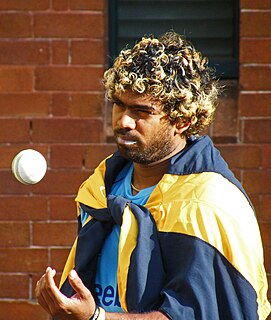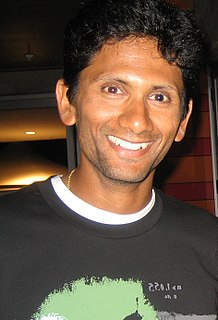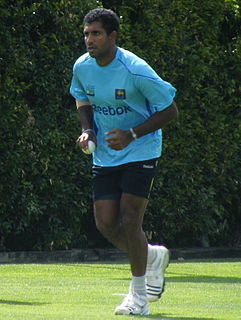Related Research Articles

The India men's national cricket team, also known as Team India or the Men in Blue, represents India in men's international cricket. It is governed by the Board of Control for Cricket in India (BCCI), and is a Full Member of the International Cricket Council (ICC) with Test, One Day International (ODI) and Twenty20 International (T20I) status.

Wasim Akram HI is a Pakistani cricket commentator, coach, and former cricketer and captain of the Pakistan national cricket team. Akram is widely regarded as one of the greatest fast bowlers of all time, and several critics regard him as the greatest left-arm fast bowler of cricket history. In October 2013, Wasim Akram was the only Pakistani cricketer to be named in an all-time Test World XI to mark the 150th anniversary of Wisden Cricketers' Almanack.

Separamadu Lasith Malinga, nicknamed "Slinga Malinga", is a Sri Lankan former cricketer who is widely regarded as one of the greatest limited overs bowlers of all time. Malinga captained the Sri Lankan 2014 T20 World Cup winning side and is the only bowler to take 4 wickets in 4 balls twice in international cricket. Malinga is a right-arm fast bowler that is commonly used as a specialist death bowler, and is well known for his distinctive round-arm action, sometimes referred to as a sling action, hence his aforementioned nickname. Malinga announced his retirement from all forms of cricket on 14 September 2021.

Herath Mudiyanselage Rangana Keerthi Bandara Herath, known as Rangana Herath, is a former Sri Lankan cricketer, who played all forms of the game and a former Test captain for Sri Lanka. Herath is the most successful left arm bowler in Test cricket history. He is currently working as spin bowling consultant with the Bangladesh cricket team.
The Indian Oil Cup 2005 was a three-team One Day International (ODI) cricket tournament held in Sri Lanka between 30 July and 7 August 2005. The participating teams were hosts Sri Lanka, and India and West Indies. Sri Lanka won the tournament beating India by 18 runs in the final.

Bapu Krishnarao Venkatesh Prasad, is a former Indian cricketer, Cricket Coach, Commentator who played Tests and ODIs. He made his debut in 1994. Primarily a right-arm medium-fast bowler, Prasad was noted for his bowling combination with Javagal Srinath.

Mohammad Akram Hussain Khan is a former Bangladeshi cricketer. A hard hitting middle order batsman, Akram played first-class cricket for Chittagong Division. He is currently the chief selector of the BCB, along with Habibul Bashar and Minhajul Abedin.

Enamul Haque Moni, also known as Enamul Haq Moni, is a former Bangladeshi cricketer who played in 10 Tests and 29 ODIs from 1990 to 2003. After retiring from competitive cricket he became an umpire, and made his first appearance in an ODI between Bangladesh and Zimbabwe on 3 December 2006. He is the first Bangladeshi Test-match cricketer to umpire in international cricket.

Kariyawasam Tirana Gamage Dhammika Prasad, or simply Dhammika Prasad, is a former Sri Lankan cricketer, and current bowling coach of the Nepal national cricket team. He is a right-arm fast-medium bowler. He has represented Sri Lanka in Test, One Day International (ODI) and Twenty20 cricket and played domestic cricket for the Sinhalese Sports Club and Basnahira North.
The Indian cricket team are two times World Champions. In addition to winning the 1983 Cricket World Cup, they triumphed over Sri Lanka in the 2011 Cricket World Cup on home soil. They were also runners-up at the 2003 Cricket World Cup, and semifinalists four times(1987, 1996, 2015, 2019). India's historical win–loss record at the cricket world cup is 53-29, with 1 match being tied and another one being abandoned due to rain.
The Indian cricket team made its Test cricket debut in 1932 and has since advanced to be among the top four test teams in the in each of 2005 to 2008. The team won the ODI Cricket World Cup in 1983 and 2011. In other major International victories, Team India won the Twenty20 World Cup in 2007 and ICC Champions Trophy in 2002 and 2013.
The Chappell–Ganguly controversy was caused by a series of events in late 2005 and early 2006 which involved highly publicised infighting in the Indian cricket team between the then newly appointed coach Greg Chappell and captain Sourav Ganguly. The dispute resulted in the removal of Ganguly as captain and his replacement by vice-captain Rahul Dravid in November 2005, with Ganguly being dropped from the ODI team. Ganguly was also dropped from the Test team at the end of January 2006. The dispute stirred up strong emotions in India, ranging from fiery street protests in Ganguly's home town of Kolkata and his home state of West Bengal, to speeches in the Parliament of India. Eventually Ganguly was recalled to the team in both forms of cricket in late 2006 after his replacements lost form, and was selected as a part of the Indian team for the 2007 Cricket World Cup.
Bangladesh, Pakistan and Sri Lanka competed in the second Asian Test Championship between August 2001 and March 2002. India pulled out of the tournament due to political tensions with Pakistan.
The 1992–93 SAARC Quadrangular was the inaugural SAARC Quadrangular cricket tournament. It started in Dhaka, Bangladesh in December 1992 amidst great enthusiasm and excitement.
The third and final SAARC Quadrangular was held in Dhaka in February 1997. The Pakistan 'A' team, led by Asif Mujtaba, won the trophy after beating India 'A' in a rain affected final.
The 1996 Singer Cup was a triangular cricket tournament held between 1 and 7 April 1996 in Singapore. The competition featured the national cricket teams of India, Sri Lanka and Pakistan. The tournament was won by Pakistan, which defeated Sri Lanka in the final on 7 April.
The 1996 Pepsi Sharjah Cup was a triangular ODI cricket competition held in Sharjah, United Arab Emirates from 12 to 19 April 1996. It featured the national cricket teams of South Africa, Pakistan and India. Its official sponsor was Pepsi. The tournament was won by South Africa, which defeated India in the final.
The 1997 Pepsi Independence Cup was a quadrangular ODI cricket tournament held in May 1997 to commemorate the 50th anniversary of the independence of India. It featured the national cricket teams of New Zealand, Pakistan, Sri Lanka and the hosts India. The tournament was won by Sri Lanka, which defeated Pakistan in the best-of-three finals.
The Silver Jubilee Independence Cup was a One Day International cricket tournament held in Dhaka, Bangladesh during January 1998. The tournament was held as a celebration of 25 years of Bangladesh's independence and all the games were held at Bangabandhu National Stadium, Dhaka, Bangladesh.India, Pakistan and the hosts Bangladesh were the participating teams in the tournament.
The 1997–98 Coca-Cola Triangular Series was a One Day International cricket tournament held in India in May 1998. It was a tri-nation series between Bangladesh, India and Kenya. India defeated Kenya in the final to win the tournament.
References
- ↑ INDIAN CRICKET 1995 (Compiled by P.V. Vaidyanathan), (Kasturi & Sons Limited, Madras, India)